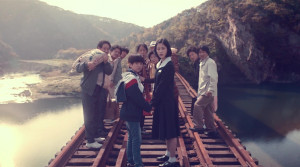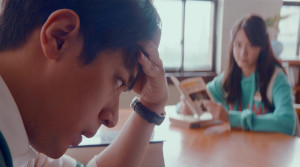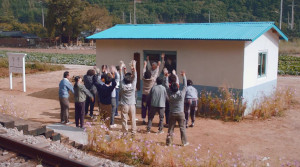

Gi-jeok
South Korea 2021
Genre:
Drama
Director:
Lee Jang-hoon
Cast:
Park Jung-min
Lee Soo-kyung
Yoona
Lee Sung-min
Kim Kang-hoon
Jung Moon-sung
Kim Dong-hyeon

Miracle: Letters to the President

Story: It is the year 1986 in a remote village of the Gyeongsang province. There are no roads leading in or out of the village and there is no train station either. Just tracks that lead through the village. If the inhabitants want to leave the village, they have to walk along the tracks. This is especially dangerous when they have to go through a tunnel. Villagers have often been hit by one of the trains there. Since his childhood Jung Joon-kyeong (Park Jeong-min) has therefore been writing letters to the president asking for the village to finally get a train station. By now, he is in twelfth grade and has to walk a long way out of the village every day. At his new school, not only his math teacher immediately realizes that Joon-kyeong is a math genius, his classmate Ra-hee (Yoona) also notices it and takes an interest in the boy. Because of that, Joon-kyeong is often teased by his sister Bo-keyong (Lee so-kyung). He and his sister get along very well, but the boy always keeps a distance to his father (Lee Sung-min). The father, a train operator, doesn’t do anything to improve the relationship with his son either. There seems to be a scar from his past that has never healed. But soon, Joon-kyeong has to decide if he wants to turn his back on the village for good, because with his talent he could easily study in Seoul. However, he doesn't want to leave his sister behind...





Review: This movie is based on a true story or rather the true struggle of the people of a remote village trying to get a railway station built. But the drama by no means has a political touch, which you might have expected reading the title. It is actually just about a young man who was almost hit by a train and who is now doing everything he can to ensure that the villagers no longer have to risk their lives walking on the tracks as the only way out of the place. Joon-kyeong is a strange boy, and even though all roads are open to him, thanks to his gift in mathematics, he still cannot part with his origins. And there is a specific reason for that, which we will find out about later and which will leave no doubt that the movie is a drama through and through. Yet, it's the kind of drama that offers more sunshine than rain. This is also reflected in the beautiful images creating a specific village romance.

As strange as that may sound, "Miracles" manages to create a little 2000s feeling with its 80s setting in a remote village. You feel reminded of movies like "Once in a Summer" even though that flick was much more political, had more of a romantic nature, and was set in the late 60s. In the past, Korean dramas simply had a different style. Nostalgic, without rubbing it directly into your face. "Miracle: Letters to the President" doesn't try to sugar-coat anything, it's all about the fact that people hardly think of villages, especially when the Olympic Games are soon to be held. But nature, the colors and the different seasons unfolding in the background manage to enchant us and make the story work in the first place. Because if you take a closer look, there are actually some pretty stereotypical elements featured.

After about 45 minutes, we get a twist or rather the resolution of why Joon-kyeong wants to stay in the village. It is quite cheesy, and you even have to cope with some supernatural elements. However, the movie leaves you no choice but to either get on board with the events or to just stop watching. Thanks to the dreamy atmosphere, though, you easily accept this supernatural element as part of the world. The development of the story, is less easy to accept, though, as towards the end, the movie tries to bring together some events that are not very believable but are still supposed to wrap everything up in a conclusion. Of course, the end wants to pull at your heartstrings, and because you anticipated that moment for over an hour, you are almost glad that it is not quite as hackneyed as you’d expected.

Furthermore, you can hardly say anything negative about the actors. Even though the village is still the real star of the movie, the actors are also able to carry the story with ease. The chemistry between Park Jung-min ("Deliver Us From Evil") and Lee Soo-kyung ("The Odd Family") as his sister is working particularly well. Joon-kyeong’s home is with his sister, but his self-proclaimed muse Ra-hee, portrayed by Yoona ("Exit"), shows him some new opportunities in the world. There is also a little romance added there, but both Park Jung-min and Yoona are just too old to pass as high school students, which can be rather irritating at times. Right from the start, the question repeatedly arises why the relationship with the father is so bad. Father and son seem to carry some demons from the past which still eat away at them.





The father is played by Lee Sung-min ("The Beast") whose task it is to get the drama going towards the end. Throughout the course of the story, we are also constantly thrown into the past, in order to make us understand how a specific relationship between two people in the present is to be explained. Something that is typical for Korean dramas, at least for those which are not only meant as tearjerkers, is that there is a lot of well-done humor at first, but then everything becomes a bit more tragic towards the end. As mentioned before, though, the great, warm images of the village always manage to evoke a feeling of comfort, so that there is never too much tragedy. We know that the hero of the story can only tap his full potential if he leaves his home, but we actually don’t want that for him, because life in the village is just so pleasantly slow and relaxing. In the end, "Miracle" is therefore a good drama that does not get you down and scores with a beautiful setting.

Disclaimer










